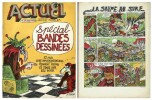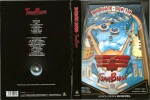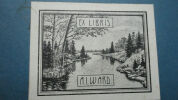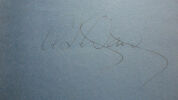7 books for « the who »Edit
-
Type
Book (6)
Disk (1)
-
Century
19th (1)
20th (1)
21st (1)
-
Topics
Comic strip (1)
Earth (1)
First edition (1)
Germanic languages (1)
Greek (1)
History (1)
Jazz (1)
Reviews (1)
Rock (1)
Rock (1)
Tea (6)
-
Countries
Denmark (1)
France (5)
Netherlands (1)
-
Syndicate
ILAB (3)
SLAM (2)
( Bandes Dessinées - Revues ) - The Who - Francis Masse - Marcel Gotlib - Richard Corben - Robert Crumb - Clay Wilson - Ronald Laing - Collectif.
Reference : 31350
Actuel n° 40 n° Spécial Bande dessinée - Conversation avec Ronald Laing - Tout sur les Who.
Actuel n° 40 de mars 1974. In-8 agrafé de 96 pages au format 27 x 21 cm. Belles couvertures illustrées par Francis Masse et Clay Wilson. Plats et intérieur frais malgré d'infimes frottis aux coins. Rare numéro spécial, entiérement consacré à la bande desssinée, avec BD de Richard Corben, Francis Masse, Robert Crumb et illustrations de Clay Wilson, Marcel Gotlib. Interview inédite de Ronald Laing. Long article consacré au groupe de Rock " Who ". Nombreuses participations et articles avec illustrations et photographies. Bel état général. Rare édition originale.
Vente exclusivement par correspondance. Le libraire ne reçoit, exceptionnellement que sur rendez-vous. Il est préférable de téléphoner avant tout déplacement.Forfait de port pour un livre 8,50 €, sauf si épaisseur supérieure à 3 cm ou valeur supérieure ou égale à 100 €, dans ce cas expédition obligatoire au tarif Colissimo en vigueur. A partir de 2 livres envoi en colissimo obligatoire. Port à la charge de l'acheteur pour le reste du monde.Les Chèques ne sont plus acceptés.Pour destinations extra-planétaire s'adresser à la NASA.Membre du Syndicat Lusitanien Amateurs Morues
Coffret Digibook 2 CD : Barón Rojo - Tommy Barón.
Como Dios Manda Records 2012. Coffret Digibook, au format 19 x 14 cm, avec 2 CD et un superbe livret. Adaptation en langue espagnole, par le légendaire groupe de Hard Rock espagnol " Baron Rojo " du mythique Opéra-Rock " Tommy " composé par Pete Townshend et par le groupe The Who. Etat superbe, comme neuf.
Vente exclusivement par correspondance. Le libraire ne reçoit, exceptionnellement que sur rendez-vous. Il est préférable de téléphoner avant tout déplacement.Forfait de port pour un livre 8,50 €, sauf si épaisseur supérieure à 3 cm ou valeur supérieure ou égale à 100 €, dans ce cas expédition obligatoire au tarif Colissimo en vigueur. A partir de 2 livres envoi en colissimo obligatoire. Port à la charge de l'acheteur pour le reste du monde.Les Chèques ne sont plus acceptés.Pour destinations extra-planétaire s'adresser à la NASA.Membre du Syndicat Lusitanien Amateurs Morues
The Who : Long Live Rock Songbook. Deutsche Ausgabe
DTV. 1980. In-12. Broché. Bon état, Couv. partiel. décollorée, Dos satisfaisant, Papier jauni. 22 pages. Texte en allemand. Nombreuses illustrations en noir et blanc, dans et hors texte.. . . . Classification Dewey : 430-Langues germaniques. Allemand
Classification Dewey : 430-Langues germaniques. Allemand
DISQUE VINYLE 33T NEW SONG, HAD ENOUGH, 905, SISTER DISCO, TRICK OF THE LIGHT, GUITAR AND PEN, LOVE IS COMING DOWN, WHO ARE YOU.
POLYDOR. non daté. In-12. Broché. Bon état, Couv. convenable, Dos satisfaisant, Intérieur frais. Pochette en couleurs, disque en anglais.. . . . Classification : 410-33 Tours
Disque n°2490 147 Classification : 410-33 Tours
(And:) Who's who in the Roman world. (And:) Who's who in classical mythology. (By) J. HAZEL & M. GRANT.
Lnd., N.Y., Routledge, 2002.
3 vols: X,284;X,367;XII,367 p. Hardb. 24 cm (Including dustjackets, in slipcase) (Heavy book, may require extra shipping costs)
On a Determination of the Mean Density of the Earth and the Gravitation Constant by means of the Common Balance. Received May 13, - Read June 4, 1891.
(London, Harrison and Sons, 1892). 4to. No wrappers as extracted from ""Philosophical Transactions"", 1891, Vol. 182 - Series A. Pp. 565-656 a. 7 lithographed plates.
First appearance of this importent paper for which Poynting was awarded the Adams Prize of Cambridge.""These days John Henry Poynting is best known for his association with the Poynting vector, which describes the flow of energy in an electromagnetic field, and little is known of his life or work. Yet in the 1890s he caught the popular imagination as the man who weighed the Earth'. His experiment, using a novel method with a common balance, was part of a heroic tradition, gained him Cambridge University's Adams Prize, and set new standards of precision. Yet in performing this experiment, Poynting seemed to step outside the traditions of late nineteenth century Cambridge University where he was educated, and it is probably significant that he was a Unitarian throughout his life.""(Isobel Falconer)..
Who's Who in Government (Vol.I only) The Biographical Research Bureau
Reference : 3747
 Write to the booksellers
Write to the booksellers









